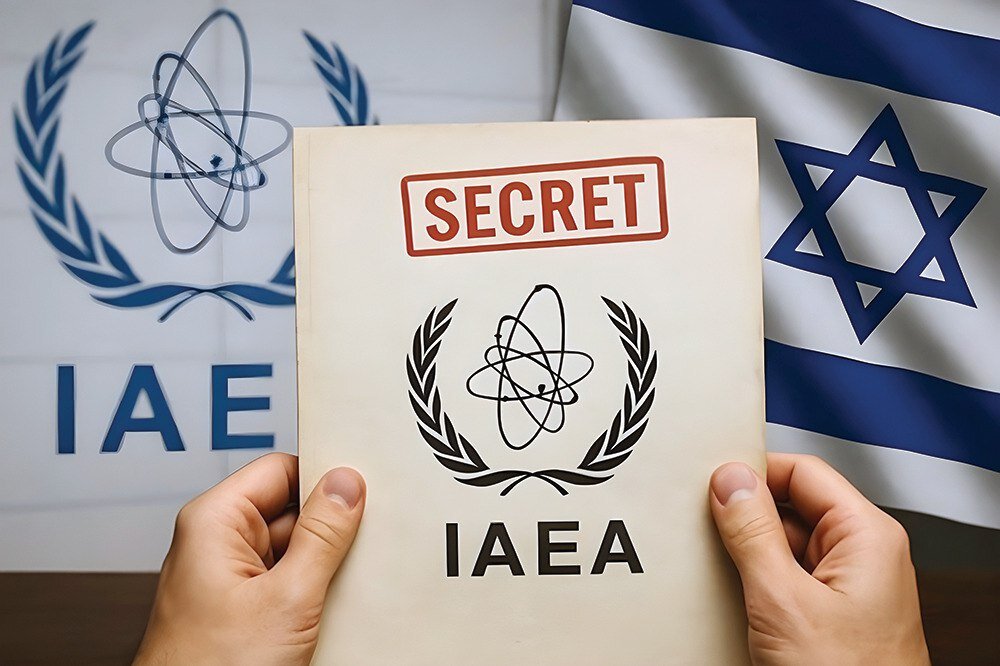Iran's Israel documents a damning expose of IAEA
Confidential Iranian letters to IAEA found in occupied territories, laying bare extent of agency's coziness with Israel

TEHRAN – Israel has long boasted that intelligence advantage in the region is on its side, claiming its espionage and surveillance capabilities are too sophisticated to be rivaled by any other actor.
The validity of that assertion was first put to question on October 7, 2023, when Palestinian Resistance forces infiltrated the occupied territories, breaching the heavily fortified walls that have besieged Gaza for the past 18 years. Israel failed to anticipate the attack and struggled to respond effectively for several hours, allowing Palestinian fighters to take prisoners back to Gaza – individuals the regime has been unable to retrieve despite its extensive destruction of the enclave.
The regime’s intelligence capabilities faced another test last week, after Iran’s national television announced that the country had obtained a large trove of classified Israeli information. Intelligence Minister Esmaeil Khatib stated that the successful operation had significantly enhanced Iran's "offensive" capabilities. He noted the ministry required considerable time to review the obtained documents, images, and videos. The Tehran Times understands that Iran obtained the secret data not only through direct access within the occupied territories but also through other operational methods.
What the data contains
The extracted information spans various sectors, but data related to the International Atomic Energy Agency (IAEA) is especially relevant in light of the agency's recent increased pressure on Tehran.
According to sources speaking to the Tehran Times, Iran uncovered confidential letters it had sent to the IAEA within the occupied territories, along with other secret documents belonging to the UN nuclear watchdog concerning its nuclear program.
One source stated that Iran suspects Israel did not obtain the letters and documents through espionage but received them directly from the IAEA. "Of course, if proven to be true, this would not be too surprising," the source said. "We have long known that the IAEA functions as a political tool, rather than a technical body with legal obligations."
A report presented to IAEA member states last month by Director-General Rafael Grossi reiterated previously addressed and refuted allegations regarding Iran's nuclear activities. That was seen as setting the stage for a resolution, anticipated at the agency's annual board meeting currently in session, accusing Iran of non-compliance with its non-proliferation commitments. Such a resolution would then pave the way for the activation of the so-called snapback mechanism, which would return anti-Iran UN sanctions lifted under the JCPOA.
It is unclear whether the newly obtained information will prompt Iran to restrict IAEA inspections of its nuclear sites, which face more scrutiny than any other nuclear facility globally. But the spokesperson of the Atomic Energy Organization of Iran (AEOI) stated Monday that Tehran would reduce its cooperation with the UN nuclear watchdog to pre-JCPOA levels if the agency does not demonstrate “gratitude”.
The IAEA's intensive inspections of Iranian nuclear sites began under the 2015 nuclear deal. Despite the West's failure to uphold its commitments and the reimposition of sanctions, Tehran has allowed IAEA inspectors to remain in the country and continue their work.
‘More targets for Iranian missiles’
Apart from the cozy relationship between the IAEA and Israel, Iran’s successful intelligence operation has led to the discovery of the locations of secret nuclear sites built by Israel in the occupied territories. In a statement published on Monday, Iran’s Supreme National Security Council (SNSC) said it now possesses a “bank of Zionist targets”.
“These [hidden] sites would be attacked in response to any Israeli strike on Iran’s nuclear infrastructure,” the statement read. Israeli officials have said they would attack Iran’s nuclear sites if indirect negotiations between Tehran and Washington fail to lead to their “dismantlement”.
Also commenting on the significance of the newly-acquired information, the chief commander of Iran’s Islamic Revolution Guards Corps (IRGC) said the Islamic Republic will be able to strike potential Israeli targets “more precisely” now.
"Undoubtedly, this sensitive intelligence will render the efforts that are aimed at accelerating the annihilation of the occupying Zionist regime more effective and increase the precision of [potential future] Iranian missile strikes,” Major General Hossein Salami wrote in a message issued on Tuesday.
Iran attacked Israeli positions in the occupied territories twice in 2024 with missiles and drones. Operation True Promise II, the second attack, achieved a success rate of over 80%.
A lot more remains undiscussed
When breaking the news of the intelligence operation in remarks to national TV, Khatib said the volume of documents obtained was so immense that “thousands of documents’ is a gross understatement compared to what has been acquired."
The Tehran Times understands that Iranian authorities have yet to publicly discuss the most significant content of the recovered documents and footage.
Leave a Comment